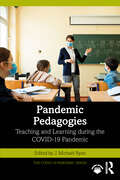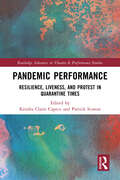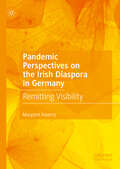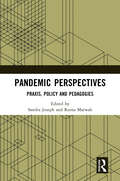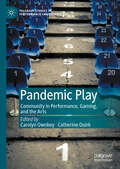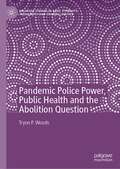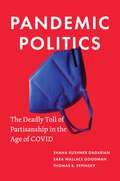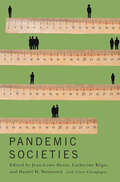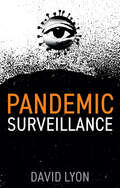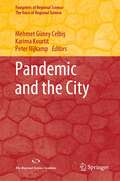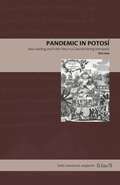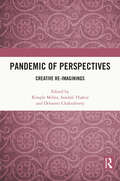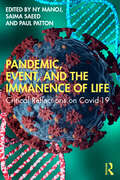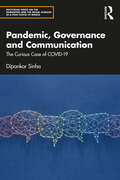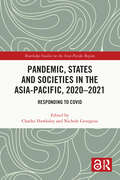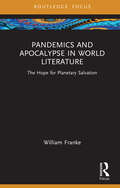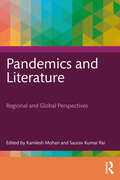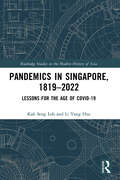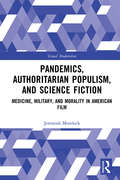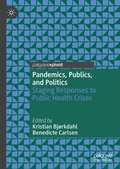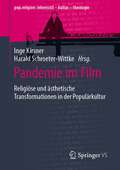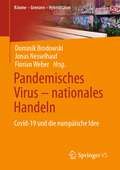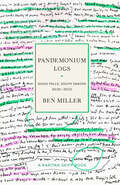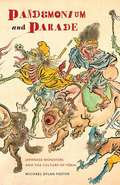- Table View
- List View
Pandemic Pedagogies: Teaching and Learning during the COVID-19 Pandemic (The COVID-19 Pandemic Series)
by J. Michael RyanPandemic Pedagogies: Teaching and Learning during the COVID-19 Pandemic provides critical insights into the impact of the pandemic on the education system, pedagogical approaches, and educational inequalities. Education is often touted as the best way to promote social mobility and produce informed members of society. The pandemic has significantly threatened those goals by temporarily disrupting education and exacerbating disparities in the education system. The scholarship in this volume takes a closer look at many of the issues at the heart of the educational process including teacher self-efficacy, the gendered and racialized impacts of the pandemic on education, school closures, and institutional responses. Drawing on the expertise of scholars from around the world, the work presented here represents a remarkable diversity and quality of impassioned scholarship on the impact of COVID-19 and is a timely and critical advance in knowledge related to the pandemic.
Pandemic Performance: Resilience, Liveness, and Protest in Quarantine Times (Routledge Advances in Theatre & Performance Studies)
by Kendra Claire CapecePandemic Performance chronicles the many ways that people are surviving/thriving through performance in a global pandemic. Covering artists and events from across the United States: from New York to California and from South Dakota to Texas, the chapters are equal parts theory and practice, weaving scholarship with personal experience from contributors who are interdisciplinary artists, scholars, journalists, and community organizers providing unique and invaluable perspectives on the complicated work of resilience during COVID-19. This study will hold interest for students and scholars in the performing arts, arts, and social justice as well as professional artmakers and creative community organizers.
Pandemic Perspectives on the Irish Diaspora in Germany: Remitting Visibility
by Margaret HavertyThis book reflects on how the pandemic impacted upon qualitative social research, but also how it affected the lives of the members of the Irish diaspora on the European continent. The crisis acted as a pressure cooker for those ‘living abroad,’ transforming distance and migration situations to resemble times gone by, when travel was far more prohibitive and emigration felt more permanent. At the same time, ‘expat lives’ were being thrown headlong into a new future, shaped more profoundly than ever by digital means. This work is a close examination of how Irish migrants in Germany construct their Irishness and, in doing so, maintain their belonging to Ireland across a geographic distance transformed by the pandemic. This work seeks to draw out the underlying patterns and meanings in the day-to-day practices of Irishness by members of Ireland’s putative diaspora in Germany by interweaving a multitude of ethnographic vignettes and rich interview material with relevant and interestingtheoretical concepts. Interlocutors see Ireland as a site of personal memory – good, bad and in-between – and of meaning-making practices. Ireland is deeply personal to them; that understood, their practices of belonging to Ireland are nonetheless embroiled in the political goal of making Ireland visible abroad.
Pandemic Perspectives: Praxis, Policy and Pedagogies
by Reena Marwah Sandra JosephThe book explores the impacts of the COVID-19 pandemic on nations across the globe since early 2020. It hosts a variety of perspectives within economic, social and development research studies, providing contemporary and proper information. The book also presents policy prescriptions for developing economies, critiques the system of disease surveillance and waste management, and defines a vision for India's development. It also mirrors issues related to digitisation, marginalisation, government regulations and health systems and provides original ideas for innovative methodologies suitable for higher education.Print edition not for sale in South Asia (India, Sri Lanka, Nepal, Bangladesh, Pakistan and Bhutan)
Pandemic Play: Community in Performance, Gaming, and the Arts (Palgrave Studies in Performance and Technology)
by Carolyn Ownbey Catherine QuirkWhen the arts, culture, and entertainment industries came to a halt in late winter 2020, many claimed this was the end of art as we knew it. Theatre managers, museum directors, performers, artists, and everyday folks had to figure out new strategies for living and thriving in a new world order. As the global pandemic and its consequences continue to play out, the question of how we have learned—as creators or consumers—to play, is far from settled. This collection addresses pandemic play in broad terms: how did creative industries adapt to a majority virtual world? How have our understandings of community and play evolved? Might new forms of art and play outlive the pandemic and supplant earlier iterations? Pandemic Play takes these questions as a starting point, exploring strategies, case studies, and effects of the arts worlds gone virtual.
Pandemic Police Power, Public Health and the Abolition Question (Palgrave Studies in Race, Ethnicity, Indigeneity and Criminal Justice)
by Tryon P. WoodsThis book critically explores how police power manifested beyond criminal law into the field of public health during the pandemic. Whilst people were engaged with anti-police violence protests, particularly in the US, they were being policed openly and notoriously by the government and medical science in the public health arena. The book explores how public health policing might be an abuse of constitutional power and encourages the abolition question to be applied consistently to the state’s discourse in the area of public health, as black people the world over continue to bear a disproportionate cost burden for public health policies. The chapters explore contemporary policing in terms of the historical context of slavery, the growth of the police and prison abolition movement and how this should be applied more widely, and how police power operates throughout society beyond the criminal justice system, in finance, technology, housing, education, and in medicine and health science. It seeks to re-examine our relationship to health sovereignty and the police power more fundamentally. It provides insights into the convergence of policing and social control of humans and argues that the most normative response is abolition.
Pandemic Politics: The Deadly Toll of Partisanship in the Age of COVID
by Thomas B. Pepinsky Sara Wallace Goodman Shana Kushner GadarianHow the politicization of the pandemic endangers our lives—and our democracyCOVID-19 has killed more people than any war or public health crisis in American history, but the scale and grim human toll of the pandemic were not inevitable. Pandemic Politics examines how Donald Trump politicized COVID-19, shedding new light on how his administration tied the pandemic to the president’s political fate in an election year and chose partisanship over public health, with disastrous consequences for all of us.Health is not an inherently polarizing issue, but the Trump administration’s partisan response to COVID-19 led ordinary citizens to prioritize what was good for their “team” rather than what was good for their country. Democrats, in turn, viewed the crisis as evidence of Trump’s indifference to public well-being. At a time when solidarity and bipartisan unity were sorely needed, Americans came to see the pandemic in partisan terms, adopting behaviors and attitudes that continue to divide us today. This book draws on a wealth of new data on public opinion to show how pandemic politics has touched all aspects of our lives—from the economy to race and immigration—and puts America’s COVID-19 response in global perspective.An in-depth account of a uniquely American tragedy, Pandemic Politics reveals how the politicization of the COVID-19 pandemic has profound and troubling implications for public health and the future of democracy itself.
Pandemic Societies
by Jean-Louis Denis, Catherine Régis, and Daniel WeinstockAt the outset of the COVID-19 pandemic, many thought the changes taking place would be fleeting. It is now widely recognized that COVID-19 will not be the last pandemic in our highly interconnected world, and “pandemic societies” will be with us for some time.Pandemic Societies brings together experts in a wide range of academic disciplines to reflect on how their fields might be transformed in this new context. While the pandemic forces global institutions, such as the World Health Organization, to reimagine the ways in which they function, it also reaches into our everyday lives to change how we organize culture, performing arts, sports, tourism, and cities. Exploring how COVID-19 has altered people’s daily experiences – the ways they meet to play, to perform, and to entertain themselves – this book also pulls the lens back to take in the broader institutional and political contexts in which these quotidian activities are carried out.Examining the profound ways in which the COVID-19 pandemic has transformed every aspect of our lives, Pandemic Societies attempts to understand how we might act to steer this pandemic society, and how to reinvent institutions and practices that we think of as intrinsically face to face.
Pandemic Surveillance
by David LyonThe COVID-19 pandemic has disrupted life as we knew it. Lockdowns, self-isolation and quarantine have become a normal part of everyday life. Pandemic surveillance allows governments and corporations to monitor and surveil the spread of the virus and to make sure citizens follow the measures they put in place. This is evident in the massive, unprecedented mobilization of public health data to contain and combat the virus, and the ballooning of surveillance technologies such as contact-tracing apps, facial recognition, and population tracking. This can also be seen as a pandemic of surveillance. In this timely book, David Lyon tracks the development of these methods, examining different forms of pandemic surveillance, in health-related and other areas, from countries around the world. He explores their benefits and disadvantages, their legal status, and how they relate to privacy protection, an ethics of care, and data justice. Questioning whether this new culture of surveillance will become a permanent feature of post-pandemic societies and the long-term negative effects this might have on social inequalities and human freedoms, Pandemic Surveillance highlights the magnitude of COVID-19-related surveillance expansion. The book also underscores the urgent need for new policies relating to surveillance and data justice in the twenty-first century.
Pandemic and the City (Footprints of Regional Science)
by Peter Nijkamp Karima Kourtit Mehmet Güney CelbişThis book features a collection of novel and original contributions to the study of urban sustainability from a human health perspective in the light of the current corona pandemic and the challenge of cities to offer inclusive, appealing, and healthy infrastructures. Written by experts from various disciplines, this book analyzes the impact of the corona pandemic on contemporary cities, and how these cities respond to the challenges. Featuring also case studies on various cities and regions, it addresses four interconnected research challenges and themes: Cities, cooperation, and resilience in the face of COVID-19Comparative approaches on patterns and effects of city and location-specific policies and socioeconomic structures during COVID-19The socioeconomic and labor market effects of pandemics on cities and local economiesThe need for new types of data and applications in addressing challenges in analysing the effects of COVID-19 on citiesThis book will appeal to scholars of regional and spatial science, urban economics, and urban planning and anyone interested in the impact of corona pandemic on city life.
Pandemic in Potosí: Fear, Loathing, and Public Piety in a Colonial Mining Metropolis (Latin American Originals #18)
by Kris LaneIn 1719, a deadly and highly contagious disease took hold of the Imperial Villa of Potosí, a silver mining metropolis in what is now Bolivia. Within a year, the pathogen had killed some 22,000 people, just over a third of the city’s residents. Victims collapsed with fever, body aches, and effusions of blood from the nose and mouth. Most died within days. The great Andean pandemic of 1717–22 was likely the most destructive disease to strike South America since the days of the Spanish conquest.Pandemic in Potosí features the single longest narrative of this nearly forgotten period, penned by local historian Bartolomé Arzáns de Orsúa y Vela, along with shorter treatments of the disease’s ravages in Cuzco, Arequipa, and the outskirts of Lima. The "Gran Peste," as it was called, was a pivotal event about which Arzáns wrote at length because he lived through it, but also because it was believed to have cosmic significance. Kris Lane translates and contextualizes Arzáns’s account, which is rich in local detail that sheds light on a range of topics—from therapeutics, devotional life, class relations, gender, and race to conceptions of illness, sin, and human will and responsibility during a major public health crisis.Original narratives of the pandemic, translated here for the first time, help readers see commonalities and differences between past and present disease encounters. Designed for use in courses on Latin American history, this concise work will also interest scholars and students of the history of religion, history of medicine, urban studies, and epidemiology.
Pandemic in Potosí: Fear, Loathing, and Public Piety in a Colonial Mining Metropolis (Latin American Originals)
by Kris LaneIn 1719, a deadly and highly contagious disease took hold of the Imperial Villa of Potosí, a silver mining metropolis in what is now Bolivia. Within a year, the pathogen had killed some 22,000 people, just over a third of the city’s residents. Victims collapsed with fever, body aches, and effusions of blood from the nose and mouth. Most died within days. The great Andean pandemic of 1717–22 was likely the most destructive disease to strike South America since the days of the Spanish conquest.Pandemic in Potosí features the single longest narrative of this nearly forgotten period, penned by local historian Bartolomé Arzáns de Orsúa y Vela, along with shorter treatments of the disease’s ravages in Cuzco, Arequipa, and the outskirts of Lima. The “Gran Peste,” as it was called, was a pivotal event about which Arzáns wrote at length because he lived through it, but also because it was believed to have cosmic significance. Kris Lane translates and contextualizes Arzáns’s account, which is rich in local detail that sheds light on a range of topics—from therapeutics, devotional life, class relations, gender, and race to conceptions of illness, sin, and human will and responsibility during a major public health crisis.Original narratives of the pandemic, translated here for the first time, help readers see commonalities and differences between past and present disease encounters. Designed for use in courses on Latin American history, this concise work will also interest scholars and students of the history of religion, history of medicine, urban studies, and epidemiology.
Pandemic of Perspectives: Creative Re-imaginings
by Rimple Mehta Debaroti Chakraborty Sandali ThakurThis volume brings together academics, activists, social work practitioners, poets, and artists from different parts of the world during the Covid-19 pandemic. It sheds light on how the pandemic has exposed the inequities in society and is shaping social institutions, affecting human relationships, and creating new norms with each passing day. It examines how people from diverse societies and fields of work have come to conceptualise and imagine a new world order based on the principles of social and ecological justice, care, and human dignity. It prioritises the realm of imagination, creativity, and affect in understanding social formations and in shaping societies beyond the positivist approaches. Documenting the myriad experiences and responses to the pandemic, the volume foregrounds varied processes of making meaning; understanding impulses, resistances, and coping mechanisms; and building solidarities. Further, it also acts as a tool of memory for future generations, and articulations- artistic, political, socio-cultural, scientific- of hope and perseverance. This spectrum of expressions intends to value visceral experiences, build solidarities, and find solace in art. Its uniqueness lies in the way it brings together a much-needed interface between science, social sciences, and humanities. A compelling account on our contemporary lives, the volume will be of great interest to scholars of sociology and social anthropology, politics, art and aesthetics, psychology, social work, literature, health, and medical sciences.
Pandemic, Event, and the Immanence of Life: Critical Reflections on Covid-19
by Paul Patton Saima Saeed Ny ManojThis volume reflects on different regional and national experiences of the Covid 19 pandemic, with contributions from India, Thailand, Singapore, Australia, Italy, United States, and Canada.This book draws upon a number of approaches but especially the works of Deleuze and Guattari, Agamben, Derrida, Foucault, Habermas, Latour, and Serres. It looks at the methodological aspects of treating the pandemic, focuses on laying out the posthuman condition of the event largely problematizing the immanence of life which affirms the transversal Deleuzian ethic of life, and extends the politics of life to the domain of immunology. Together, the authors make it apparent that the pandemic is a multifaceted event, or many different kinds of events – virological, informational, phenomenological, social, and discursive. The authors skilfully develop these different dimensions of the pandemic event and show the relations between them. These essays will enrich the reader’s understanding of the pandemic and its effects, while demonstrating the depth and breadth of the resources that humanities scholarship can mobilize to help us understand such phenomena.This volume will be useful to students of posthumanism, medical humanities, health communication, political communication, semiotics, literature, cultural theories, and major strains of thought from contemporary continental philosophy.
Pandemic, Governance and Communication: The Curious Case of COVID-19 (Routledge Series on the Humanities and the Social Sciences in a Post-COVID-19 World)
by Dipankar SinhaThis book focuses on what is arguably the most devastating phenomenon in the history of modern civilization, the COVID-19 pandemic. It shows how, on the one hand, the pandemic has exposed governments the world over to deal with a major health crisis; and, on the other, efforts by the ruling forces to enforce surveillance on people and disciplining them by maneuvering cutting-edge digital technology in the name of security and safety. Second, it explores how the mainstream versions of crisis communication and risk communication face huge challenges during a pandemic. Finally, it analyses how the pandemic propels an extraordinary expansion of infodemic — rapid spread of excessive quantities of misinformation and disinformation of the fake and false variety — and how social media in particular becomes its main tool in causing subversion of the prevalent information order. Engaging, comprehensive and accessible, this book will be of immense importance to scholars and researchers of politics, especially governance and political communication, communication studies, and public health management. It will be vital for public policy professionals, experts in thinktanks, career bureaucrats, and non-governmental organizations.
Pandemic, States and Societies in the Asia-Pacific, 2020–2021: Responding to COVID (Routledge Studies on the Asia-Pacific Region)
by Nichole Georgeou Charles HawksleyHawksley and Georgeou bring together scholars and practitioners from across the region to analyse the main effects of the first two years of the COVID pandemic in a range of case studies from Southeast Asia, East Asia, South Asia, and Oceania.The book provides a broad survey of how Indonesia, Bangladesh, Japan, the Philippines, Vietnam, Nepal, Australia, Cambodia, Taiwan, and New Zealand attempted to manage the COVID pandemic; the challenges they faced; and how they fared. Drawing on insights from politics, economics, sociology, law, public health, education, and geography, most authors are nationals of the cases they discuss. Written in non-specialist language, ten case studies are examined, providing a useful analysis of the first two years of COVID in the Asia-Pacific from the emergence of COVID in January 2020 to the lifting of restrictions in December 2021. Chapters focus on different issues according to the scholar’s academic expertise, and a wide diversity of national pandemic experiences, challenges, and responses are showcased.An essential read for scholars and students interested in the areas of Asia-Pacific politics, sociology, and public health.Chapter 8 of this book is freely available as a downloadable Open Access PDF at http://www.taylorfrancis.com under a Creative Commons Attribution-Non Commercial-No Derivatives (CC BY-NC-ND) 4.0 license.
Pandemics and Apocalypse in World Literature: The Hope for Planetary Salvation (Routledge Focus on Literature)
by William FrankePandemics and Apocalypse rereads classical narratives of plague from the Bible (Exodus) and classical antiquity, both Greek (Homer, Thucydides, Sophocles) and Roman (Lucretius, Virgil, Ovid), through the Middle Ages (Dante, Boccaccio) and Modernity (Defoe, Manzoni, Artaud, Camus) as a basis for contemplating the significance of the recent Covid-19 pandemic. It concerns how we are to confront future pandemics and other inextricably related crises, notably those of an ecological nature. Responses to Covid-19 typically set everything on defeating this “enemy,” but actually we cannot eliminate viruses without eliminating ourselves. We need to see the pandemic as revealing us to ourselves in our inherently vulnerable condition as a first step to admitting the infinite openness to one another and to our Ground—physical and metaphysical—that alone can save our world by engendering a different attitude, open and engaged, to one another and to the Earth as sources of our collective life.
Pandemics and Literature: Regional and Global Perspectives
by Kamlesh Mohan Saurav Kumar RaiThis volume provides a literary-cum-historiographical analysis of epidemics and pandemics. It looks at folklore, tribal folktales, eyewitness accounts, memoirs and missionary writings from India and the west to explore the history of some of the major outbreaks in history. The chapters focus on the impact of outbreaks such as plague, cholera, malaria, tuberculosis and COVID-19, upon the material life of people, their social dislocation and their complex responses to such crises.The book studies the role of pandemics in pushing scientists, social actors and littérateurs to develop new paradigms in knowledge generation, theories of environmental dislocation and the economic slide. It examines themes such as changes in the perception of epidemic diseases across different periods of history, popular responses to state intervention during epidemics, gendering epidemics, as well as the impact of rumours during epidemics.An important contribution to the social history of health and medicine, the volume will be useful for students and researchers of cultural studies and medical anthropology, public health, literature, history of pandemics and epidemics, sociology of medicine and South Asian studies.
Pandemics in Singapore, 1819–2022: Lessons for the Age of COVID-19 (Routledge Studies in the Modern History of Asia)
by Kah Seng Loh Li Yang HsuSingapore has faced many pandemics over the centuries, from plague, smallpox and cholera to influenza and novel coronaviruses. By examining how different governments responded, this book considers what we can learn from their experiences. Public health strategies in the city-state were often affected by issues of ethnicity and class, as well as failure to take heed of key learnings from previous outbreaks. Pandemics are a recurrent and normal feature of the human experience. Alongside medical innovation and evidence-based policymaking, the study of history is also crucial in preparing for future pandemics.
Pandemics, Authoritarian Populism, and Science Fiction: Medicine, Military, and Morality in American Film (Visual Modernities)
by Jeremiah MorelockWith a focus on I Am Legend and Day of the Dead—two series of film remakes of popular science fiction stories—this book addresses the social origins of the recent surge in authoritarian and populist social movements. Exploring the ways in which the themes of tribalism, confidence in medical science, and confidence in military violence changed over the years in the process of re-telling these stories in popular culture, the author identifies the shift towards a narrowing of moral scope, an embrace of military violence and a distrust of medical science with three elements of authoritarian populism: tribalism, distrust of rational elites and their institutions, and willingness for violent coercion. An engaging study of popular culture that sheds light on contemporary political attitudes, Pandemics, Authoritarian Populism, and Science Fiction will appeal to scholars of sociology, social theory, and cultural studies with interests in critical theory, film studies, and science fiction.
Pandemics, Publics, and Politics: Staging Responses To Public Health Crises
by Kristian Bjørkdahl Benedicte CarlsenPandemics are potentially very destructive phenomena, and for that reason, they both fascinate and frighten us. And because they are shot through with uncertainty, they often become sites of contestation and conflict. This book presents research on the 2009 pandemic and other public health crises in an attempt to describe and analyze the distinctive challenges that such diseases pose today. Thanks to vaccines, more reliable provision of medical services, more effective means of communication, and a more educated public, some argue we will not see a new Black Plague – or even Spanish Flu – in our time. Today we face new challenges, however, which can both enable diseases to reach pandemic scales and affect our ability to enact an appropriate response. Those include fragmentation of media, tribalization of “knowledge regimes,” the increasingly troubled status of scientific and political expertise, growing cross-continental mobility, as well as the globalization and commercialization of pandemic response systems. These distinctive complexities make the need to stage public action in response to pandemics and other public health crises a crucial problem, on which thousands of human lives hinge. This volume consists of a handful of social science and humanities studies of precisely such complexities, and thus offers a much-needed supplement to existing research on pandemics and pandemic response.
Pandemie im Film: Religiöse und ästhetische Transformationen in der Populärkultur (pop.religion: lebensstil – kultur – theologie)
by Harald Schroeter-Wittke Inge KirsnerUntersucht wird die theologische und ästhetische Bearbeitung der Pandemien in dystopischen und Science-Fiction-Filmen sowie Serien. Zwischen Verschwörungstheorien, der Sicht als Strafe Gottes und der fatalistischen Annahme eines "notwenigen Übels" changieren die Erklärungsmodelle im Film wie auch in der gesellschaftlichen Wirklichkeit. Filme bieten dabei stellvertretend narrative Lösungsmodelle an. Die Katastrophe wird auf diese Weise dem beängstigenden Alltag für kurze Zeit enthoben, was eine der Reflexion zuträgliche Distanz ermöglicht. Exemplarisch wird ein sich wandelndes Rollen-, Gesellschafts- und Gottesbild aufgezeigt, das zu religionspädagogischen Reflexionen anregt.
Pandemisches Virus – nationales Handeln: Covid-19 und die europäische Idee (Räume – Grenzen – Hybriditäten)
by Dominik Brodowski Florian Weber Jonas NesselhaufDie Covid-19-Pandemie fordert die europäische Idee heraus: Denn nicht nur die EU-Außengrenzen, sondern auch Binnengrenzen innerhalb des Schengen-Raums wurden ab Frühjahr 2020 wieder verstärkt kontrolliert, durch an deren Überquerung anknüpfende Quarantäne- und Test-Vorschriften zum Hindernis oder auch zeitweise ganz geschlossen. Damit sind die geographischen Grenzverläufe für Berufspendelnde, für Ausflügler:innen oder für Einkaufende wieder ,real‘. Doch reichen die Auswirkungen über Transit, Tourismus und Handel weit hinaus: Mit den verstärkten Kontrollen, Quarantänepflichten und Schließungen verändert sich auch die Wirkung der territorialen Grenz(ziehung)en. Das betrifft schließlich auch die grenzüberschreitende Zusammenarbeit in binneneuropäischen Grenzregionen. Im Zusammenspiel aus Kultur-, Raum- und Rechtswissenschaften erfolgt im Sammelband eine multiperspektivisch vertiefende Beleuchtung zu Covid-19 und der europäischen Idee.
Pandemonium Logs: Sioux Falls, South Dakota, 2020–2022 (Raritan Skiff Books)
by Ben MillerIn 2015, Ben Miller and the poet Anne Pierson Wiese moved from New York City to Sioux Falls, South Dakota, to explore their midwestern roots and to focus on their writing careers. Working a day job in a hospital, Miller had a front-row seat to the COVID-19 pandemic as it moved from the coasts to the urban Midwest. Pandemonium Logs casts an unflinching eye on the state of the worker in the US health-care system during a global pandemic, giving voice to the doctors, nurses, support staff, patients, and families caught in the complex swirl of daily dilemmas and crucial choices. In unsparing yet sympathetic prose, Ben Miller creates an intimate portrait of the impact of COVID on the diverse people of South Dakota. Through a wide range of characters—from understandably confused patients to quietly competent nurses—he explores the human complexities of the crisis: a doctor based in Mumbai who treats critically ill patients in the Dakotas via a tenuous hodgepodge of telehealth apparatus, a Hydra of six workplace trainers who together cannot train one employee to do one job, a vice president of corporate hospitality who lives to rip down safety signs as fast as nurses post them, a ninety-year-old hospital volunteer who pushes wheelchairs containing patients half his age. In Pandemonium Logs, Miller provides precise and moving observations of ordinary people doing extraordinary things.
Pandemonium and Parade: Japanese Monsters and the Culture of Yokai
by Michael FosterWater sprites, mountain goblins, shape-shifting animals, and the monsters known as yôkai have long haunted the Japanese cultural landscape. This history of the strange and mysterious in Japan seeks out these creatures in folklore, encyclopedias, literature, art, science, games, manga, magazines, and movies, exploring their meanings in the Japanese cultural imagination and offering an abundance of valuable and, until now, understudied material. Michael Dylan Foster tracks yôkai over three centuries, from their appearance in seventeenth-century natural histories to their starring role in twentieth-century popular media. Focusing on the intertwining of belief and commodification, fear and pleasure, horror and humor, he illuminates different conceptions of the "natural" and the "ordinary" and sheds light on broader social and historical paradigms―and ultimately on the construction of Japan as a nation.
